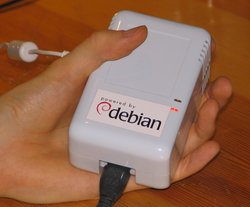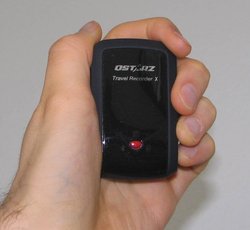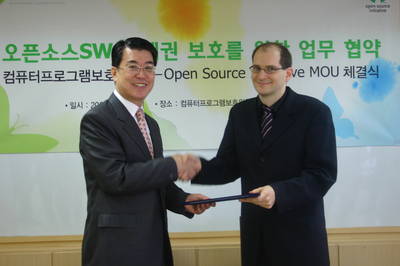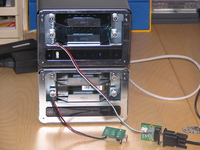

I received a
SheevaPlug this
week, an intriguing device that packs incredible power and functionality
into a tiny package. As many of you know, I've been doing a lot of work on
Debian for the Linksys
NSLU2 in the last few years. The NSLU2 is a key reason why ARM has
become the third most popular architecture in Debian (after 32 and 64 bit
x86), and I believe a main reason is that the NSLU2 is so incredibly cheap.
At a price under $100, most people don't think too long and simply buy a
device and do something cool with it.
The SheevaPlug is being offered at the same price range but offers
considerably more. Riku Voipio asked the
right
question: "What would you do with something approximately 10x more
powerful with same prize/size range?" I believe the SheevaPlug is a killer
replacement for the NSLU2 and here's why:
- Marvell Kirkwood 6281 CPU at 1.2 GHz with 256 KB L2 cache (compared to
a 266 MHz CPU)
- 512 MB RAM (compared to lousy 32 MB)
- 512 MB flash, enough for a basic Debian installation (compared to 8 MB)
- Gigabit Ethernet (compared to 100 Mb) and no proprietary microcode
required
- 1x USB and 1x SD (compared to 2x USB: the only advantage the NSLU2 has)
- ... and finally: mini-USB with serial console and JTAG: while Debian on
the NSLU2 works well and is stable, we regularly had users whose system
would no longer boot and there was no good way to figure out why. The
serial console on the SheevaPlug actually allows users to figure out what's
going on.
I'm incredibly excited about the SheevaPlug and the first thing I did was
to take the device apart and look at the inside. The results can be found
in the
SheevaPlug
image gallery. My next project will be slightly more productive:
porting Debian.
As I see it, we should support the following three installation variants
for the SheevaPlug:
- To an external USB drive or stick.
- To an SD card.
- To the 512 MB flash memory on the device.
The first two should be relatively straight forward, but of course
installing to the internal flash memory is particularly interesting given
that 512 MB (plus compression) is enough for a basic installation of
Debian. Unfortunately, installations to MTD flash are currently not
supported in the Debian installer but I hope we can find a volunteer who
wants to implement this functionality.
My next steps are to put a kernel for the SheevaPlug into the archive and
to get a basic installation going. From there we can look at more
sophisticated installation options and other functionality.
 It took me a while because of travel and other projects, but I finally
released a tar ball containing Debian lenny for the SheevaPlug along with
some installation
instructions. It should be really easy to install Debian this way, but
I'll also make sure that SheevaPlug support will be in the Debian installer
for the next release of Debian. For now, check out the tar ball I
prepared!
It took me a while because of travel and other projects, but I finally
released a tar ball containing Debian lenny for the SheevaPlug along with
some installation
instructions. It should be really easy to install Debian this way, but
I'll also make sure that SheevaPlug support will be in the Debian installer
for the next release of Debian. For now, check out the tar ball I
prepared!
 Spring has arrived in Europe and I'm looking forward to spending more
time outdoors. While I was pondering some plans, I thought it would be
nice to have a GPS. I've never used a GPS before but it seems it will
allow me to combine outdoors activities such as walking and hiking with
geek things. In particular, I'm interested in tracking where I'm going
(what route, what distance, what speed, etc), geotagging photos and
possibly contributing to OpenStreetMap. Since last week, I have a
Qstarz BT-Q1000X (Travel Recorder X), a GPS logger and receiver, and
I've been playing around with it a bit. This device uses the new MTK II
chip, which gives good accuracy and long battery time.
I've created a new gps category in which I'll share my
experience using a GPS in general and specifically the Qstarz BT-Q1000X.
I've also created a
Spring has arrived in Europe and I'm looking forward to spending more
time outdoors. While I was pondering some plans, I thought it would be
nice to have a GPS. I've never used a GPS before but it seems it will
allow me to combine outdoors activities such as walking and hiking with
geek things. In particular, I'm interested in tracking where I'm going
(what route, what distance, what speed, etc), geotagging photos and
possibly contributing to OpenStreetMap. Since last week, I have a
Qstarz BT-Q1000X (Travel Recorder X), a GPS logger and receiver, and
I've been playing around with it a bit. This device uses the new MTK II
chip, which gives good accuracy and long battery time.
I've created a new gps category in which I'll share my
experience using a GPS in general and specifically the Qstarz BT-Q1000X.
I've also created a  What seems like eons ago, I ordered one of those
What seems like eons ago, I ordered one of those  SOCOP is working on a number of activities related to open source,
including:
SOCOP is working on a number of activities related to open source,
including:
 This post is to:
This post is to:
 I received a
I received a  I received a sample of QNAP's new TS-219 Turbo NAS today. The TS-119 and
TS-219 devices are an upgrade to QNAP's TS-109 and TS-209 devices and were
announced earlier this month at CeBIT. The new TS-219 uses the same robust
case as the TS-209 but offers much more performance:
I received a sample of QNAP's new TS-219 Turbo NAS today. The TS-119 and
TS-219 devices are an upgrade to QNAP's TS-109 and TS-209 devices and were
announced earlier this month at CeBIT. The new TS-219 uses the same robust
case as the TS-209 but offers much more performance: